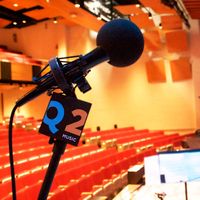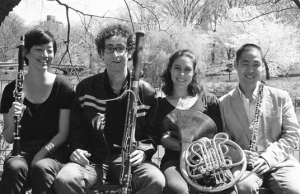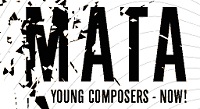
Sometimes, classical music gets a bad rap. To be perfectly honest, there is a chunk of the population that finds it to be synonymous with any number of derogatory terms: boring, annoying, or pompous. Some classical music lovers and advocates will counter this popular belief with arguments that only go to further the opinion of the other side: “Some people want to listen to mindless music”, “Some people simply don’t have patience”, etc. These ridiculous arguments only go to further the stereotype that classical music lovers are all pompous windbags who believe themselves to be uniquely educated and informed.
How, then, do we get people to forget their misconception, and believe that EVERYONE can enjoy or even love classical music, regardless of education, socioeconomic standing, or profession?
It all comes down to how classical music is presented; and now, for a limited time, you could join one organization that does it right.

Watching the beginning of a new ensemble is always exciting. But there’s a difference between a group that sets up camp in known territory — say, in the mineral-rich lands of string quartet literature, or in the breadbasket of Pierrot — and a group that strikes out for the wilderness, to make a repertoire where there had been none.
In the last year, I’ve seen the launch of two groups with this mission. The Deviant Septet went to that place Stravinsky discovered in “L’histoire du Soldat” but that was never settled by others — clarinet, trumpet, trombone, bass, bassoon, violin, percussion. They added two new pieces, by Ruben Naeff and Sefan Freund, at their incredibly fun inaugural concert in May. By next May there will 12 more by 12 new composers, all based on Stockhausen’s Tierkreis.
The DZ4 wind quartet (that’s oboe, clarinet, bassoon, horn) has a similar mission, to build a repertoire from scratch through projects that involve many composers tackling similar projects. Their debut concert, “One Hot Minute,” featured 20 one-minute compositions by 20 different composers (I got to be one, and was much rewarded by their terrific musicianship and heartfelt enthusiasm). This Friday they’ll perform their second project, “The Well-Tempered DZ4,” in which 24 composers each take on a different minor or major key.
These groups are doing something that I, especially as a composer, find really inspiring — they’re committing to an unknown music. Composers, go write for them! They’re stellar players, great to work with; check out the concert and say hi.
The Well-Tempered DZ4
Friday October 21st, 2011
10:15pm
Greenwich House
46 Barrow Street, New York
C Major- Jacob Garchik
A Minor- Bradley Detrick
G Major- Karl Kramer
E Minor- Lauren Winterbottom
D Major- Pauline Kim
B Minor- Jonathan Russell
A Major- Evan Premo
F# Minor- Gareth Flowers
E Major- Eric Wubbels
C# Minor- Jane Antonia Cornish
B Major- James Blachly
G# Minor- Ted Hearne
F# Major- Mohammed Fairouz
Eb Minor- Caleb Burhans
Db Major- Mike Block
Bb Minor- David Byrd-Marrow
Ab Major- Charlie Porter
F Minor- Glenn Cornett
Eb Major- Nathan Burke
C Minor- Matt McBane
Bb Major- Ryan Carter
G Minor- Ken Thomson
F Major- Zachary Detrick
D Minor- Ryan Francis
Composers, performers, or music-lovers looking for an interesting day job: PostClassical Ensemble needs a manager for their group. Contact Joseph Horowitz at jh AT josephhorowitz DOT com for more information.
Here’s a brief job description:
Managing Director, PostClassical Ensemble. Cutting-edge, 8-year-old DC-based chamber orchestra seeks half-time administrative director. The director will work with Artistic Director (Joseph Horowitz) and Musical Director (Angel Gil-Ordonez). Wide-ranging responsibilities include: budgeting, contracts, web management, marketing, artistic/strategic planning, fund-raising, radio broadcasts (WFMT; Sirius XM), Naxos recordings and DVDs, touring, etc. Our thematic programming incorporates dance, theater, film. Close collaboration with National Gallery of Art, Georgetown University (our Educational Partner), Strathmore Music Center.
The 2011 Celebrate Asia competition from the Seattle Symphony is now open!
Seattle Symphony’s Celebrate Asia announces the second Seattle Symphony Celebrate Asia Composition Competition. The Competition seeks to promote and recognize young composers who are interested in Asian culture, music and traditions. The concept originated in 2008, when local Asian leaders wanted to find a way to strengthen bonds with the broader community through a cultural celebration. Celebrate Asia is part of the Seattle Symphony’s Around the World series.
The Seattle Symphony, presenting its 109th season in 2011–2012, will come under the artistic leadership of Music Director Designate Ludovic Morlot in September 2011, following the close of Gerard Schwarz’s Farewell Season as Music Director. The Orchestra performs in the acoustically superb Benaroya Hall in downtown Seattle. The Symphony is internationally recognized for its adventurous programming of contemporary works, its devotion to the classics, and its extensive recording history. From September through July, the Symphony is heard live by more than 315,000 people.
•Award and Performance
The winning composer will receive a $1,000 cash award and an opportunity to visit Seattle for the world premiere. The winning score will be performed by Seattle Symphony and conductor Mei Ann Chen on February 24, 2012, in Benaroya Hall at the annual Celebrate Asia! concert.
•Eligibility
All composers born after January 1, 1966, are eligible.
•Jury
Ludovic Morlot, Seattle Symphony Music Director
Simon Woods, Seattle Symphony Executive Director
Elena Dubinets, Seattle Symphony Vice President of Artistic Planning
Members of the Seattle Symphony Artistic Advisory Committee
•Submission Guidelines
1.Works must have Asian influences (for example: Asian folk melodies, Asian stories and legends, Asian traditional instruments).
2.Works must be new, original and accessible.
3.Works should be 3 to 6 minutes in duration.
4.Works should be for orchestra or chamber orchestra with instrumentation no larger than 3333 – 4331 – T+3 – hp – kybd – str. Woodwind doublings are allowed.
5.The submitted work must have had no prior performances.
6.Interested composers should submit:
– A legible, bound, full score
– A recording of the piece on a CD (midi-format is OK)
– A clear description of the composition’s Asian influence(s)
– A biography, with current address, e-mail address, and phone number
– If selected, professionally prepared parts will be required 60 days before the concert.
•Entry Fee and Deadline
There is no entry fee. All entries must arrive no later than Friday, October 21, 2011. Seattle Symphony is not responsible for lost or damaged material. The winning composition will be announced before Friday, November 18, 2011.
•Send submission to:
Seattle Symphony Celebrate Asia Composer Competition
ATTN: Amy Stagno
Seattle Symphony
P.O. Box 21906
Seattle, WA 98111-3669
Questions and inquiries may be emailed to: celebrateasia@seattlesymphony.org
 The San Francisco Bay Area is home to a sizable community of sound artists, instrument inventors, and intonation innovators who spend all their time developing original and never-before-heard ways of relating to music and sound. The local scene got a big national nod in 2008 when Walter Kitundu got the mysterious and exhilarating phone call and windfall that is the MacArthur Fellowship.
The San Francisco Bay Area is home to a sizable community of sound artists, instrument inventors, and intonation innovators who spend all their time developing original and never-before-heard ways of relating to music and sound. The local scene got a big national nod in 2008 when Walter Kitundu got the mysterious and exhilarating phone call and windfall that is the MacArthur Fellowship.
With such a lively local pool of talent, it’s natural that it has its own festival — Music for People and Thingamajigs — celebrating its 14th year from September 22nd to 25th, 2011. Edward Schocker and Dylan Bolles started it at Mills College in 1997, and it’s grown up to include a non-profit parent organization, Thingamajigs, and a profusion of programs including performances and arts education.
The festival Call for Proposals just went out this week. Artists and composers working with invented instruments and/or alternate tuning systems, and performing ensembles featuring either one or both, are invited to submit proposals. The deadline is June 15, 2011, although proposals which come in on or before May 15, 2011 will be included in festival grant proposals “and will have a greater chance of receiving outside funding,” says founder Schocker.
Proposals should include a bio of the artist/performer/composer(s), a specific description of the work or performance to be considered, and documentation of the submitted work (CD or link to a website). Thingamajigs prefers electronically submitted proposals, sent to people@thingamajigs.org, but will accept hard copies at Thingamajigs.org, 5000 MarcArthur Blvd PMB 9826, Oakland, CA, 94613, USA.
 Word has reached us that NYC’s long-running MATA new-music festival is looking for an new Artistic Director, and maybe it could just be you:
Word has reached us that NYC’s long-running MATA new-music festival is looking for an new Artistic Director, and maybe it could just be you:
The position requires a broad knowledge of contemporary musical practices and communities (local, national, and international), strong organizational and interpersonal skills, and a clear, inclusive artistic vision. Key to the AD position is the ability to maintain high visibility in the music community as both a participant and audience member. Attention will be paid most closely to applicants who are currently active in the New York music community as a composer and/or performer. Along with the ED, the AD serves on MATA’s Board, ex officio, thereby gaining access to invaluable opportunities to develop relationships potentially important to his/her own career. There is an annual salary of $10,000 for this part-time position.
The full info is in this PDF:
MATA Artistic Director Information.PDF
You’ve got until Jan. 4, 2010 to get off your tush and apply. If you’re a composer/performer who’s always saying “what these festivals really need to have is XXX and YYY”, well here’s your chance!
